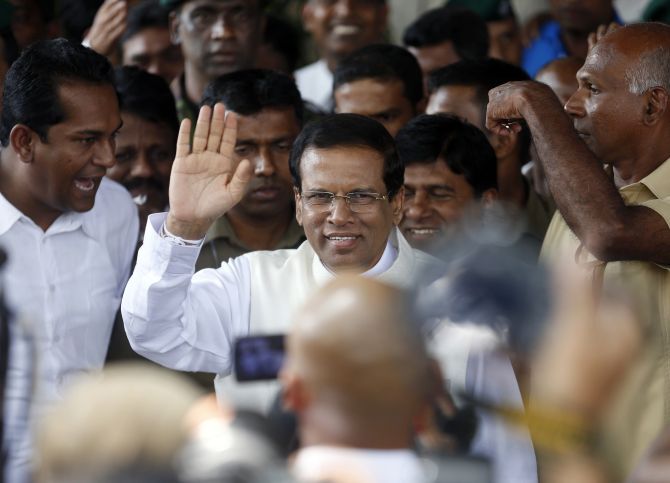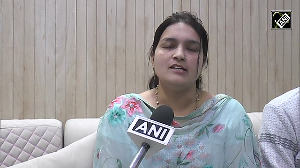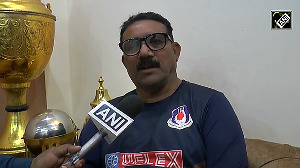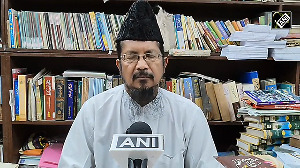President Maithripala Sirisena's government in Colombo has clearly decided to restore some balance in its diplomatic outreach, which presents a great opportunity for India, says Nitin A Gokhale

Sri Lanka's new Foreign Minister Mangala Samaraweera -- an old hand in the country's diplomatic outreach -- sent out all the right signals that would have pleased all his interlocutors in New Delhi when he came visiting India on January 18, 2015.
"My meetings were warm and friendly and all interactions left us feeling optimistic about the future of Indo-Sri Lanka relations," the minister told a select group of media persons.
Samaraweera met Prime Minister Narendra Modi, External Affairs Minister Sushma Swaraj and National Security Adviser Ajit Doval among others.
"I was in India to restore ties that were somewhat strained in the last few years," he added.
That Samaraweera chose to travel to India less than a week after a new cabinet was installed in Sri Lanka indicates the shifting priorities in Colombo which had admittedly grown closer to China under former president Mahinda Rajapaksa.
Rajapaksa had deftly played China against India each time New Delhi sought to apply pressure on his government on issues such as more autonomy for Tamil areas and genuine reconciliation with the community in the wake of the end of a 25-year-old war against the Liberation Tigers of Tamil Eelam in May 2009.
Going by the flurry of bilateral visits planned between India and Sri Lanka over the next two months, President Maithripala Sirisena's government in Colombo has clearly decided to restore some balance in its diplomatic outreach.
New Delhi, for once relatively free from the domestic political compulsions and ruled by a stable majority government, has reacted swiftly too. Sirisena is scheduled to be in the capital sometime in February, and Modi will pay a return visit in March by all indications.
When he does, it will be the first State visit by an Indian prime minister to Sri Lanka after then prime minister Rajiv Gandhi's rather tense and unhappy foray in 1987, at the height of that country's civil war. It is incredible that no Indian prime minister thought it important enough to visit Sri Lanka on a purely bilateral trip all these years.
Bilateral visits apart, India should use the opportunity provided by the change of guard in Colombo to make sure that the island nation heals the wounds left behind by over three decades of ethnic strife between majority Sinhalas and minority Tamils.
Fortunately, as Samaraweera confessed, the Sirisena government is perhaps the first truly inclusive ruling combine in Sri Lanka. The overwhelming support extended to Sirisena by the Tamils and Muslims -- if only to oust Rajapaksa -- is an opportunity to put in place a lasting reconciliation in the country by devolving genuine powers to the minorities.
Whether it is done by implementing the 13th amendment to the Sri Lankan constitution, or by even going beyond it is a matter of detail.
Rajapaksa may have been defeated; but Sirisena's task is not easy, especially because he is being propped up by a coalition of disparate political forces ranging from strongly pro-Tamil to pro-Sinhala parties, and from leftists to parties focussed solely on Muslim rights.
During the campaign, Sirisena's pointed omission about any future concession for the Tamils, makes the alliance partners such as the Tamil National Alliance slightly wary.
Sirisena also has a tricky task to weigh the option of scaling down the military, grown beyond Sri Lanka's current genuine need because of the tendency in the previous regime to exaggerate the threat to country's unitary status.
In doing so, Rajapaksa may have allowed the large Chinese stakes in vital sectors of Sri Lanka more than necessary. In a clever move, the Chinese have granted huge soft loans to build ports, roads and power plants to Sri Lanka.
Whenever the Sri Lankans have expressed their inability to repay the loans, the Chinese have sought to turn parts of the loans into equity, giving them part ownership stakes. The Sirisena government has started reviewing many of these projects.
Whatever the fate of the Chinese in Sri Lanka, India must stand with Colombo in its stand off with the West that seeks to punish the country for alleged human rights violations. A great opportunity has presented itself through an unexpected electoral result.
Both Colombo and New Delhi must seize the moment to better their ties and improve the lives of their people.
Image: Sri Lanka's newly elected President Mithripala Sirisena, seen here after his win. Photograph: Dinuka Liyanawatte/Reuters











 © 2025
© 2025